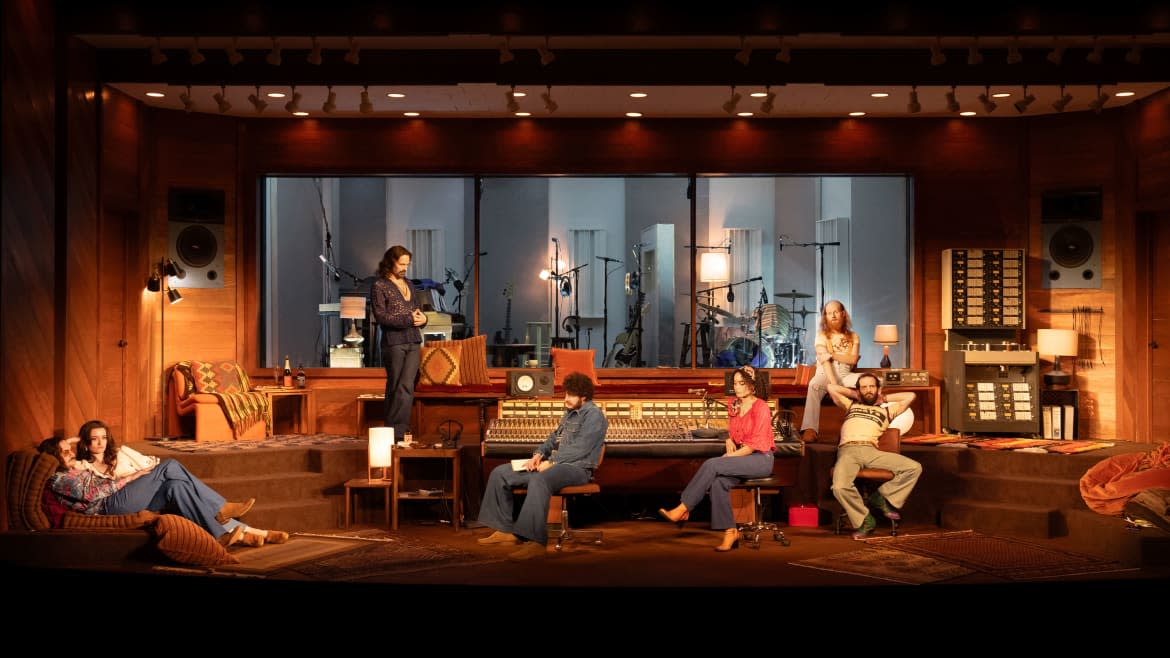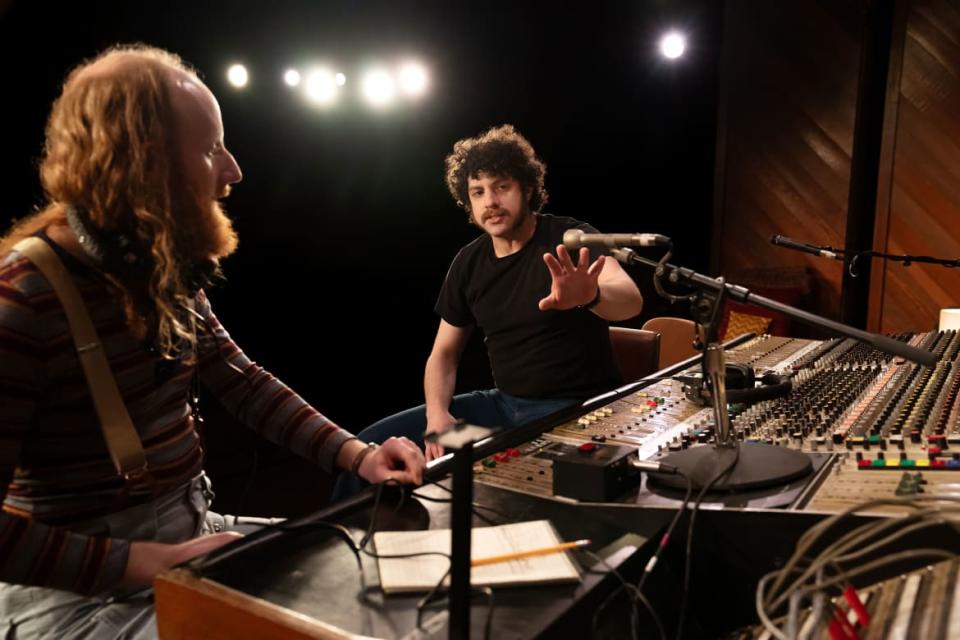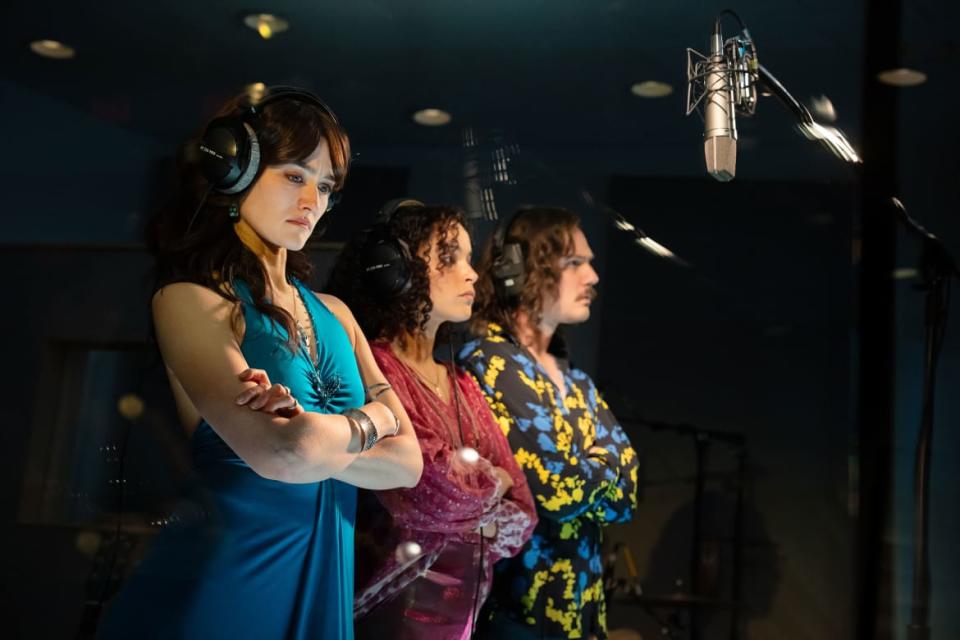Review: Why ‘Stereophonic’ Is Broadway’s Most Blazingly Original Hit

This is an edited version of The Daily Beast’s review of the off-Broadway production of Stereophonic, which was published on Oct. 29, 2023.
You know a piece of theater has done something right when, many days later, it is still provoking pin-pricks of intrigue, revelation, and mystery in one’s mind. And so it is with Stereophonic (Golden Theatre, booking to July 7)—one of the most original, stunningly designed, and technically dazzling plays in New York, newly transferred to Broadway following a rave-reviewed and received off-Broadway run at Playwrights Horizons last autumn. Stereophonic is a must-experience, rather than simply a must-see—and deserves to be a frontrunner at the soon-to-be announced Tony Award nominations.
This critic’s only concern with the news of its deserved transfer was anything in its upscaling that could damage its earlier incarnation of theatrical perfection, particularly its ingenious stage design and innovative use of sound in telling the story of a dysfunctional, though brilliant, band trying to make an album. (My concern was needless: Stereophonic remains pretty damn fabulous.) Daniel Adjmi’s play is a tad over three hours, its script and focus ranging all over the place. People talk over one another, they lounge around, there is a lot of chatter intelligible only to those musos or lovers and friends of musos who spend large amounts of time in recording studios. Once you ease into its singular, almost fly-on-the-wall dramatic world, you’re mesmerized.
How Ali Louis Bourzgui of ‘The Who’s Tommy’ Became Broadway’s Breakout Star
This play comes with wonderful music by Will Butler, formerly of Arcade Fire, with orchestrations by Butler and music director Justin Craig—thunderingly good punctuations to the action of a studio-bound ’70s rock band—with pronounced echoes of Fleetwood Mac, although director Daniel Aukin maintained it was not specifically about any one band in an interview with The New York Times—as they work on an album between July 1976 and June 1977. The first three acts are set in a recording studio in Sausalito, California, the final act in a recording studio in Los Angeles as the band sing, record, fight, have technical screw-ups and emotional blow-ups (and pass around a bag of cocaine).
Thankfully, David Zinn’s set—so perfect it deserves every award—is as cleverly inviting and intimate on Broadway as it was off. We are facing a recording studio mixing desk room head on, then beyond that—separated by a sheet of soundproofed glass—the recording booth itself. The mid-’70s leaks from every pore of the room, with tapestry cushions, shag pile and globe-ish lamps (the just as ingenious lighting design is by Jiyoun Chang).
Ryan Rumery’s astonishing sound design means we hear conversations not only in both arenas, but also realistically channeled from the studio, as the mixing room would hear it. Enver Chakartash’s flared, patterned, and bell-bottomed costumes and Robert Pickens and Katie Gell’s (lanky, bushy) wig and hair design are similarly era-nailing.

Andrew R. Butler, left, and Eli Gelb in Stereophonic.
Rumery’s work is so accomplished, sound design actually becomes key to the play—the arguments, intimacies, the music are all filtered through it. It is so good it will make you realize how important sound design is. It will make you want to celebrate sound design, and wonder when it has been so recently distinctive on stage (Mikhail Fiksel’s work on Dana H. perhaps).
In Stereophonic, the mixing desk is the province of amiable sound engineer Grover (Eli Gelb) and his nervy, always-in-retreat assistant Charlie (Andrew R. Butler). Grover has not been entirely honest about his bona fides, and whey-faced Charlie is so invisible no-one knows his name. Somehow Grover manages to get the necessary work done, despite the menacing ego (and occasionally vicious tongue) of lead vocalist Peter (Tom Pecinka— so good at being a psychologically controlling tyrant that your audience as ours may rumble with anger every time he turns his gaslight on).
Peter is in a relationship with fellow lead vocalist Diana (Sarah Pidgeon), whom he cajoles, compliments, diminishes, and gaslights in a malign, controlling whirl of mutters and invective. Diana wants to forge her own path professionally and personally, and the most uncomfortable sequences of the play revolve around him trying to manipulate her into line.
Another couple, Reg (Will Brill—excellent as a druggy, boozy British bass player) and keyboard and vocal artist Holly (Juliana Canfield), are, like Peter and Diana trying to figure out what they are to each other—Reg and Holly beginning the play as separated. Drummer Simon (Chris Stack) is away from his wife and children, and—in one extended sequence—having trouble with the instruments of his craft, with poor Grover trying to identify and resolve it as Simon’s impatience grows.
The witty, barbed, sometimes expansive, sometimes stunted exchanges between the characters are punctuated by Butler’s songs, which even more amazingly the actors are singing and playing instruments to (you may wonder where the real band are hiding offstage; nope, they are right in front of you doing this thing).
The tone and mood of the play is set at the beginning as Simon and Diana chat about the night before, as Grover and Charlie set the studio up. The bandmates’ conversations freewheels from good dry cleaning to porn to Diana meaningfully insisting, “I do not have a confidence problem. I’m just getting my motors running.”

(l to r) Sarah Pidgeon, Juliana Canfield, and Tom Pecinka in Stereophonic.
Grover tells Charlie the four rules of engineering: “You need to show up; you need to pay attention; you need to tell the truth; and you need to deal with the consequences.” This he hews close to, even as tensions within the studio rise. Reg knows his messiness has helped torpedo his marriage; Simon addresses him in a mocking babyish tone as a “sad, sad man in a blanket.”
“I’m not wiping your face anymore in the middle of the night so you don’t choke on your vomit,” Holly tells him.
The songs are beautiful, strong, pulsing interludes to remind us how great this band are away from the kvetching and bitching; you hope they find a way through their morass of problems to finish the album. Holly comes to realize “a relationship, any relationship, is a series of negotiations.” Peter’s control over the band, and his attempted control over Diana, becomes harder and uglier as time goes on. Diana, whose solo song is long and may be up top be cut if the album becomes too long. asks him why he feels the need to “move my hand and force my hand and control every single thing.”
When he tries to convince her the answer to their problems is for her to have a baby, she says, “You’ll be fine. My life will be ruined! We’ll have a screaming baby. I’ll be tripping all over my breast milk.” Grover and Charlie, and by extension us, listen into one major hissing row in the studio via a talkback switch.
“Fucking Watergate in here,” Grover notes as the atmosphere of the studio darkens, correctly identifying Peter—who wrongly blames him for one major snafu; it’s Peter’s fault—as a “fucking terror.”
Indeed, Gelb’s adorable and professional Grover emerges as the steadying hero of the hour, marshaling the band to working functionality and technical perfection; to Peter’s credit he ensures Grover is promoted rightly to a producer. If music doesn’t work out for him, send the man to the UN. The show’s merchandise should include “Justice For Grover” T-shirts and buttons.
“I’m a shrink. I’m a politician. It’s all politics, man. Everyone’s fucking insane,” Grover says about keeping the listing ship upright. “My dad walked out when I was a kid and that’s what my mom told me: Suffer and learn. So I learned.”
The play circles itself, mulling relationships, music, Diana’s independence, the last gasps of her and Peter as a couple, and the grit of just getting the job done. Holly and Grover get into it over the movie Don’t Look Now, and what it means when it comes to loss and love. Diana and Peter’s mutual hatred comes to the fore at the microphone—“I can’t stand to look at your voice!”/“I should burn your hair off, I’d like to see you bald.”
Peter will not listen to reason, only to himself. As Simon says in his very British understated way: “I love you Peter, but you’re not a team player, and that’s pretty clear.”
Adjmi and Peckinka don’t find any easy way out for Peter. “I am controlling because I am fearful of losing everything,” he pleads to Diana, who you will to ignore every pathetic, desperate word of slimy control and kick him to the kerb. Peter means what he says, but in his sniveling we see what damage a damaged person can do to others.
And yet, he loves music, and he’s very good at making it. Everyone on stage is—we hear this in every song they sing. And so, after all the backchat, after all the rowing and joking and baiting and problems, the thing that stands out—the thing you remember days later—is the music, the art, the devotion to making the art. This means that both the act of making the music the fictional band does in front of us, and also the work of art we have seen, makes Stereophonic a unique act of creation about the act of creation. In this sense, Stereophonic becomes an impressive double artistic achievement.
Get the Daily Beast's biggest scoops and scandals delivered right to your inbox. Sign up now.
Stay informed and gain unlimited access to the Daily Beast's unmatched reporting. Subscribe now.

